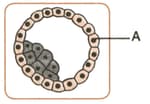Implantation
Implantation: Overview
This topic describes the process of implantation in detail. Implantation is the process that occurs when blastocyst gets embedded in the endometrium of the uterus.
Important Questions on Implantation
Match the items given in Column I with those in column II and select the correct option given below.
| Column I | Column II |
| (A) Trophoblast | (i) Embedding of the blastocyst in the endometrium |
| (B) Cleavage | (ii) Group of cells that would differentiate as an embryo |
| (C) Inner cell mass | (iii) The outer layer of blastocyst attached to the endometrium |
| (D) Implantation | (iv) Mitotic division of the zygote |
Morula is a developmental stage between two of the following:
The number of cells present in the morula stage is _____. (Write it numerically)
A blastocyst is a hollow ball, surrounded by a single layer of cells enclosing a cavity called the blastocoel or the cleavage cavity.
Which process of embryonic development is called fractionating process, whether it is cleavage or gastrulation?
Identify the part labelled 'A' from the figure given below.

Embryonic membranes are formed from a layer of cells called _____ of blastula.
How many cells are present in morula stage.
Fill the blanks in the given statements and select the correct option.
A. The developmental stage of an animal passed in the mother's womb is called (i)
B. The outer layer of blastula is called (ii) . It does not take part in the formation of (iii)
C. (iv) is the first germ layer formed from the inner cell mass by differentiation.
Given below are four statements each with one or two blanks. Select the option which correctly fills up the blanks in any two statements.
(A) The embryo with 8 to 16 blastomeres is called (i).
(B) Embedding of the (i) in the endometrium of the uterus is called implantation and it leads to (ii).
(C) After implantation, finger-like projections appear on the trophoblast called (i), which are surrounded by the (ii) and maternal blood.
(D) Inner cell mass contains certain cells called (i) cells which have the potency to give rise to all the tissues and organs.
Read the given statements and select the correct option.
Statement 1: Upto morula stage, the cells divide without any increase in size.
Statement 2: Zona pellucida remains intact till the cleavage is complete.
Which of the following statements about morula in humans is correct?
Which of the following statement is correct with respect to the morula stage of embryo?
Which of the following embryonic stages attaches to the endometrial lining of uterus for further development?
Morula receives nutrition from ___ in uterus until implantation.
The outer layer of the blastocyst which forms the ectoderm is called
In which of the following animal cleavage divisions are restricted to a small part of cytoplasm & nucleus in animal pole of egg?
